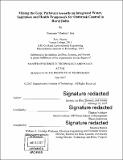Mining the gap : pathways towards an integrated water, sanitation and health framework for outbreak control in rural India
Author(s)
Ren, Xiaoyuan, S.M. (Xiaoyuan Charlene) Massachusetts Institute of Technology
DownloadFull printable version (38.45Mb)
Alternative title
Pathways towards an integrated water, sanitation and health framework for outbreak control in rural India
Other Contributors
Technology and Policy Program.
Advisor
Chintan Vaishnav.
Terms of use
Metadata
Show full item recordAbstract
The scientific connection between sanitation, water quality and health is well established. However, in the present Indian scenario, monitoring and governance of the three sectors is handled separately. At present, the need to integrate sanitation, water quality, and health is felt during waterborne disease outbreaks such as large-scale diarrhea, typhoid or cholera. Despite the general interest shown for a cross-sector integrated framework in outbreak control, numerous administrative and technical gaps exist preventing the implementation of this framework. This study attempts to address these implementation barriers through the analysis of governing institutions and data integration of large public databases for the selected districts of Gujarat, India. Interagency collaboration barrier is analyzed through a comprehensive institutional analysis on the water, sanitation and health monitoring sectors. The lack of administrative incentive due to the narrow definition of monitoring targets is identified as the primary barrier for collaboration. Districts that already achieved 100% open-defecation-free status are identified as key entry points for potential pilot implementation of an integrated framework. National Informatics Center and Water and Sanitation Management Organization (WASMO) are considered key nodal points for building channels of interagency connections. Data integration and utilization barriers are analyzed through habitation-level matching of the 3 separate monitoring databases - namely, Swatch Bharat Mission (SBM) database for sanitation, Integrated Management Information System (IMIS) database for rural drinking water quality and Integrated Disease Surveillance Programme (IDSP) for outbreak data. The most critical data barrier is the discrepancy between administrative units across the databases, resulting in 25% mismatched habitation data and variables with 30% contradictory data entries. Quality concerns over inconsistent and missing data are also raised, especially for data collected by grassroots workers. A decision support model based on the integrated database is constructed through a Driver-Pressure- State-Exposure-Effect-Action (DPSEEA) framework. A significant correlation is observed between chains connecting sanitation initiatives and water quality. Significant risk factors associated with outbreak occurrence cannot be identified at the current stage. Even though implementing this model is within reach, and doing so promises to offer an efficient tool for integrated governance of the three sectors, incomplete datasets is currently the key barrier to a comprehensive assessment of model effectiveness.
Description
Thesis: S.M. in Technology and Policy, Massachusetts Institute of Technology, School of Engineering, Institute for Data, Systems, and Society, Technology and Policy Program, 2017. Cataloged from student-submitted PDF version of thesis. Includes bibliographical references (pages 173-176).
Date issued
2017Department
Massachusetts Institute of Technology. Engineering Systems Division; Massachusetts Institute of Technology. Institute for Data, Systems, and Society; Technology and Policy ProgramPublisher
Massachusetts Institute of Technology
Keywords
Institute for Data, Systems, and Society., Engineering Systems Division., Technology and Policy Program.